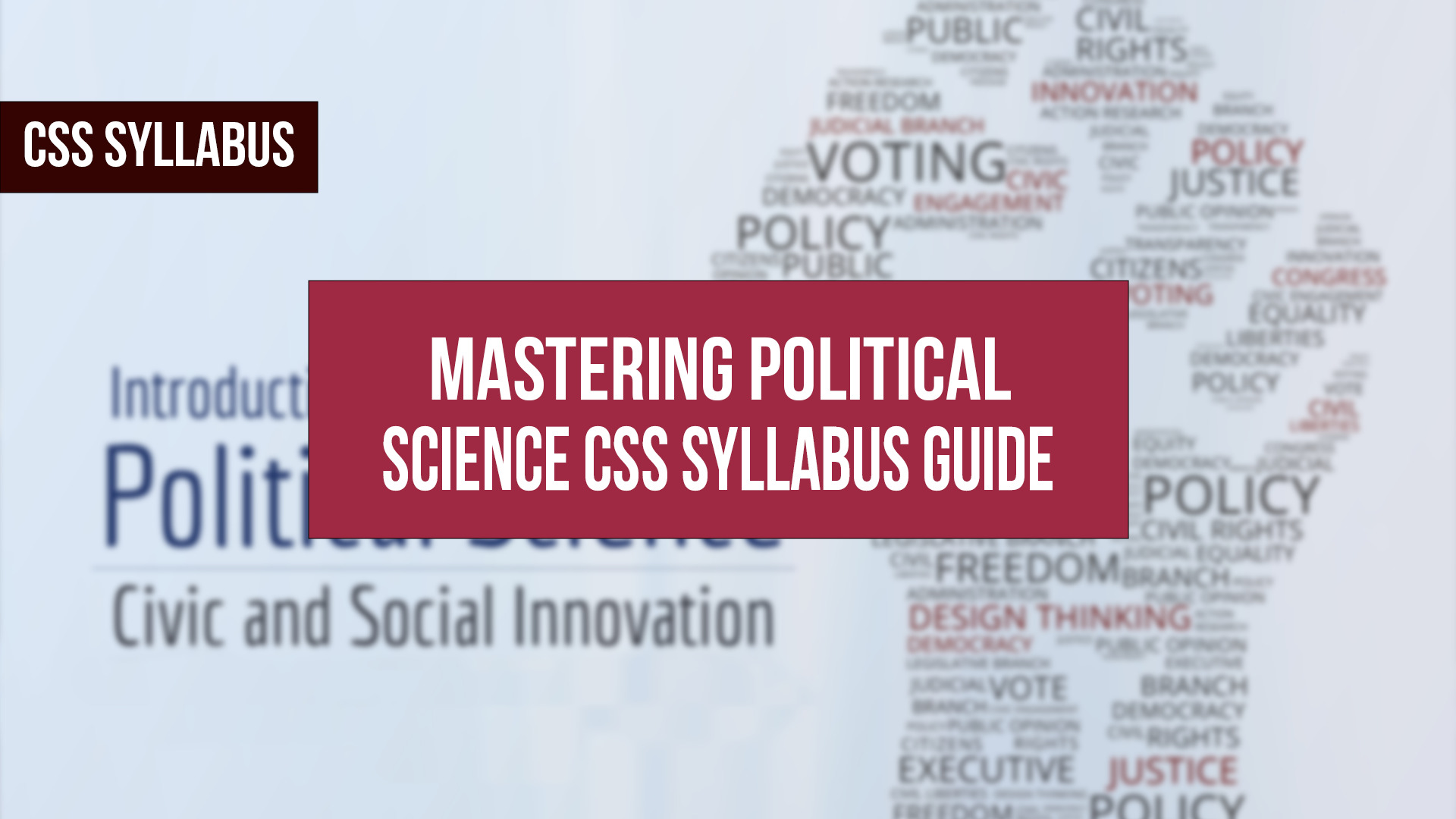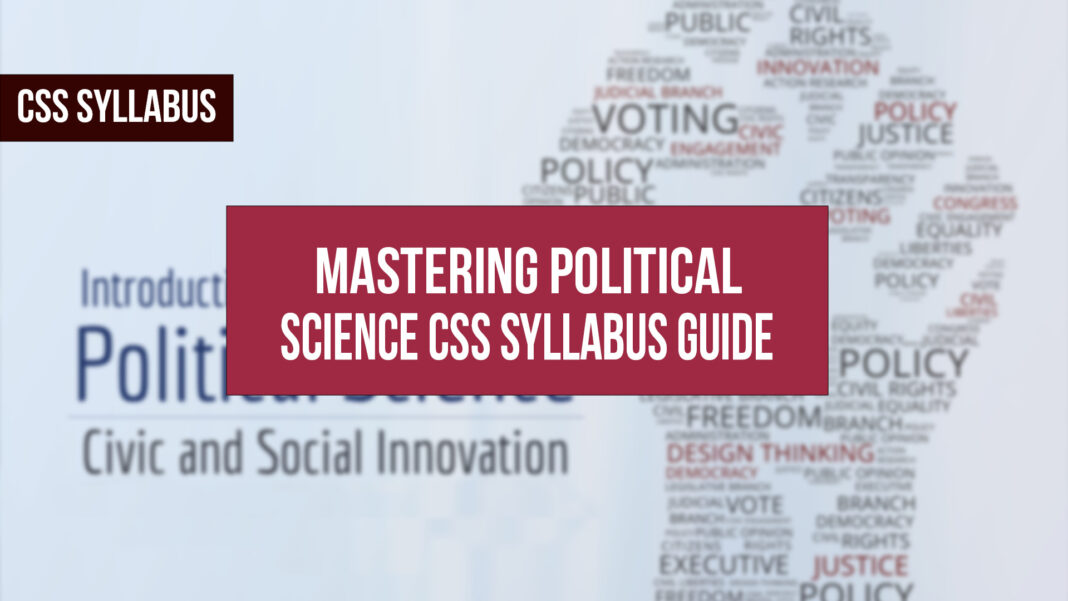Introduction
Unlocking the intricacies of political science is essential for success in the CSS exam. Our comprehensive guide is designed to provide an in-depth understanding of the CSS Political Science syllabus, ensuring you are well-prepared for the challenges ahead.

Understanding the CSS Political Science Syllabus
Foundations of Political Science
Political science lays the groundwork for understanding governance, power dynamics, and political systems. The CSS syllabus delves into the fundamental theories and principles that shape political thought. Key topics include:
- Political Philosophy: Examining influential philosophers and their impact on political ideologies.
- Comparative Politics: Analyzing different political systems and their structures.
- International Relations :The CSS Political Science syllabus places a significant emphasis on international relations.
- Diplomacy and Foreign Policy: Understanding the intricacies of diplomatic relations.
- Global Governance and Organizations: Exploring the role of international bodies in shaping global politics.
CSS Political Science Syllabus
PAPER I- (Marks – 100)
Part-A (50 Marks)
I. Western Political Thought:
Plato, Aristotle, Machiavelli, Montesquieu, Hobbes, Locke, Rousseau, Kant, Mill, Bentham,
Hegel, Marx, Lenin, Mao, Gramsci, Karl Popper, Pierre Bourdieu, John Rawls, Frances
Fukuyama, Foucault, Derrida, Kierkegaard, Jean Paul Sartre, Rene Descartes.
II. Muslim Political Thought:
Al-Farabi, Al-Mawardi, Ibn Rushd, Imam Ghazali, Ibn Taymiyyah, Nizam-ul-MulkTusi,
Ibn Khaldun, Shah Waliullah, Allama Muhammad Iqbal, Jamaluddin Afghni, Rashid Rida.
Part -B (50 Marks)
III. State System:
The nature and emergence of modern nation-state system, Islamic concept of state and
Ummah.
IV. Political Concept (Western and Islamic):
Sovereignty, Justice, Law, Liberty, Freedom, Equality, Rights and Duties, Human Rights,
Political Authority and Power.
V. Comparative Politics:
Political Socialization, Political Culture, Political Development, Political Recruitment, Social
Change, Civil Society, Violence and Terrorism in Politics, Gender and Politics, Women
Empowerment.
VI. Political Participation:
Political Change and Revolution, Elections, Electoral System, Public Opinion, Propaganda,
Political Parties, Pressure Groups and Lobbies.
VII. Political Institutions and Role of Government:
Legislature, Executive, Judiciary, Political Elites, Civil and Military Bureaucracy.
VIII. Forms of Government:
Monarchy, Democratic, Dictatorship, Totalitarian/Authoritarian, Unitary, Federal,
Confederation, Presidential and Parliamentary.
IX. Political Ideologies:
Capitalism, Marxism, Communism, Socialism, Totalitarism, Fascims, Nationalism, Islamic
Political Ideology.
129
Revised Scheme and Syllabus for CSS Competitive Examination
X. Local Self Government:
Theory and practice of Local Self-Government with special reference to Pakistan,
Comparative analyses of systems of local governance, Public Administration and Public
Policy.
PAPER-II (MARKS-100)
Part-A (30 Marks)
I. Comparative and Analytical Study of the Political Systems:
Political System of U.S.A, U.K, France and Germany
II. Global and Regional Integration
Globalization and Politics, Global Civil Society, Regional politico-economic integration and
organizational structure of the European Union, SAARC, ECO, International Financial
Regimes IMF and WTO.
Part-B (70 Marks)
III. Comparative and Analytical Study of the Political Systems:
Political system of Turkey, Iran, Malaysia, India and China.
IV. Political Movements in India (Colonial Period):
Rise of Muslim Nationalism in South Asia and Pakistan Movement (with special reference
to the role of Sir Syed Ahmed Khan, Allama Muhammad Iqbal and Quaid-i-Azam
Mohammad Ali Jinnah)
V. Government and Politics in Pakistan:
Constitution making from 1947 -1956, A comparative and critical analysis of 1956, 1962,
1973 Constitutions of Pakistan, Constitutional Amendments up-to-date, Federal Structure
in Pakistan, and Central-Provincial relations after 18th amendment,
Political Culture of Pakistan, Political Developments and the Role of Civil and Military
Bureaucracy, Judiciary, Feudalism, Dynastic Politics, Political Parties and Interest Groups,
Elections and Voting Behavior, Religion and Politics, Ethnicity and National Integration.
VI. International Relations:
History of International Relations: Post World War-II (WW-II) Period.
Foreign Policy of Pakistan: National Interests and Major Determinants i-e
1). Size/Geography
2). Economic Development
3). Security
4). Advancement in Technology
5). National Capacity
6). Political Parties/Leadership
7). Ideology
8). National Interest
9). Role of Press/Bureaucracy
130
Revised Scheme and Syllabus for CSS Competitive Examination
10). Social Structure
11). Public Opinion
12). Diplomacy.
13). Foreign Policy-making Process in Pakistan
Also External Factors like International Power Structure, International Organizations, World
Public Opinion and Reaction of other States.
Strategic Preparation Tips
Thorough Reading List
Our guide includes an exhaustive reading list, covering essential texts and contemporary literature. Ensure you cover key readings to strengthen your grasp on political science concepts.
Practice Mock Exams
Prepare for success by incorporating mock exams into your study routine. Our guide recommends specific practice materials to simulate exam conditions and enhance time management skills.
Recommended Study Schedule
A well-structured study schedule is crucial for mastering the CSS Political Science syllabus. Follow our suggested timetable to cover all topics thoroughly.
Expert Tips for CSS Political Science Exam
Analytical Writing Skills
The CSS Political Science exam requires strong analytical writing skills. Hone your abilities by practicing essay writing on diverse political topics. Our guide includes sample essay prompts for effective practice.
Stay Updated on Current Affairs
Political science is a dynamic field influenced by current events. Stay informed about global political developments to enhance your understanding and provide real-world examples in your exam responses.
Conclusion
Mastering the CSS Political Science syllabus requires a strategic approach and in-depth knowledge. Our guide equips you with the tools and resources needed to excel in the exam. Follow our recommended study schedule, delve into key topics, and practice analytical writing to ensure success. Good luck on your CSS journey!

Editor Timesglo
Editor can be reached at editortimesglo@gmail.com






